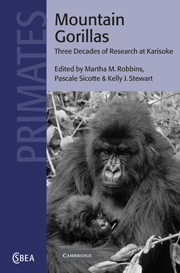Book contents
- Frontmatter
- Contents
- List of contributors
- Acknowledgements
- To Dian Fossey
- 1 Mountain gorillas of the Virungas: a short history
- Part I The social system of gorillas
- Part II Within-group social behavior
- 6 Development of infant independence from the mother in wild mountain gorillas
- 7 Social relationships of immature gorillas and silverbacks
- 8 Social relationships of female mountain gorillas
- 9 Vocal relationships of wild mountain gorillas
- Part III Feeding behavior
- Part IV Conservation and management of mountain gorillas
- Afterword: mountain gorillas at the turn of the century
- Index
6 - Development of infant independence from the mother in wild mountain gorillas
Published online by Cambridge University Press: 16 March 2010
- Frontmatter
- Contents
- List of contributors
- Acknowledgements
- To Dian Fossey
- 1 Mountain gorillas of the Virungas: a short history
- Part I The social system of gorillas
- Part II Within-group social behavior
- 6 Development of infant independence from the mother in wild mountain gorillas
- 7 Social relationships of immature gorillas and silverbacks
- 8 Social relationships of female mountain gorillas
- 9 Vocal relationships of wild mountain gorillas
- Part III Feeding behavior
- Part IV Conservation and management of mountain gorillas
- Afterword: mountain gorillas at the turn of the century
- Index
Summary
Introduction
Non-human primates exist within a wide array of complex social systems in varied ecological contexts, with the social structure of a group resulting from a network of continually changing social relationships. The life cycle of primates can be divided into four developmental stages: infancy, juvenescence, adolescence, and adulthood, each of which is characterized by an emphasis on different behavioral patterns and social relationships. Since mortality is higher in infancy than in any other life stage (Eisenberg, 1981), an infant“s caretaker plays a key role in its survival. During early infancy, the mother is the primary socializing agent and, partly as a result of this, the mother-infant dyad has been the focus of many primate studies examining various aspects of their developing relationship, resulting in models for the investigation of other dyadic relationships (e.g. Hinde, 1974, 1979).
Most of the studies detailing mother–infant relationships have been carried out on a small number of species in captive conditions (e.g. chimpanzees, Pan troglodytes: Horvat & Kraemer, 1981; Indian langurs, Presbytis entellus: Dolhinow Krusko, 1984; Japanese macaques, Macaca fuscata: Eaton et al., 1985; rhesus macaques, M. mulatta: Simpson & Simpson, 1986; patas monkeys, Erythrocebus patas: Chism, 1986; owl monkeys, Aotus trivirgatus: Dixon & Fleming, 1981). Several field studies on a number of species have also contributed significantly to our knowledge (e.g. chimpanzees: Lawick-Goodall, 1968; orangutans, Pongo pygmaeus: Horr, 1977;olive baboons, Papio anubis: Nash, 1978; yellow baboons, P. cynocephalus: Altmann, 1980; rhesus macaques: Berman, 1984; owl monkeys and titi monkeys, Callicebus moloch: Wright, 1984; Japanese macaques: Tanaka, 1989; ringtailed lemurs, Lemur catta: Gould, 1990; ruffed lemurs, Varecia variegata:Morland, 1990; howling monkeys, Alouatta palliata: Clarke, 1990).
- Type
- Chapter
- Information
- Mountain GorillasThree Decades of Research at Karisoke, pp. 153 - 182Publisher: Cambridge University PressPrint publication year: 2001
- 19
- Cited by



